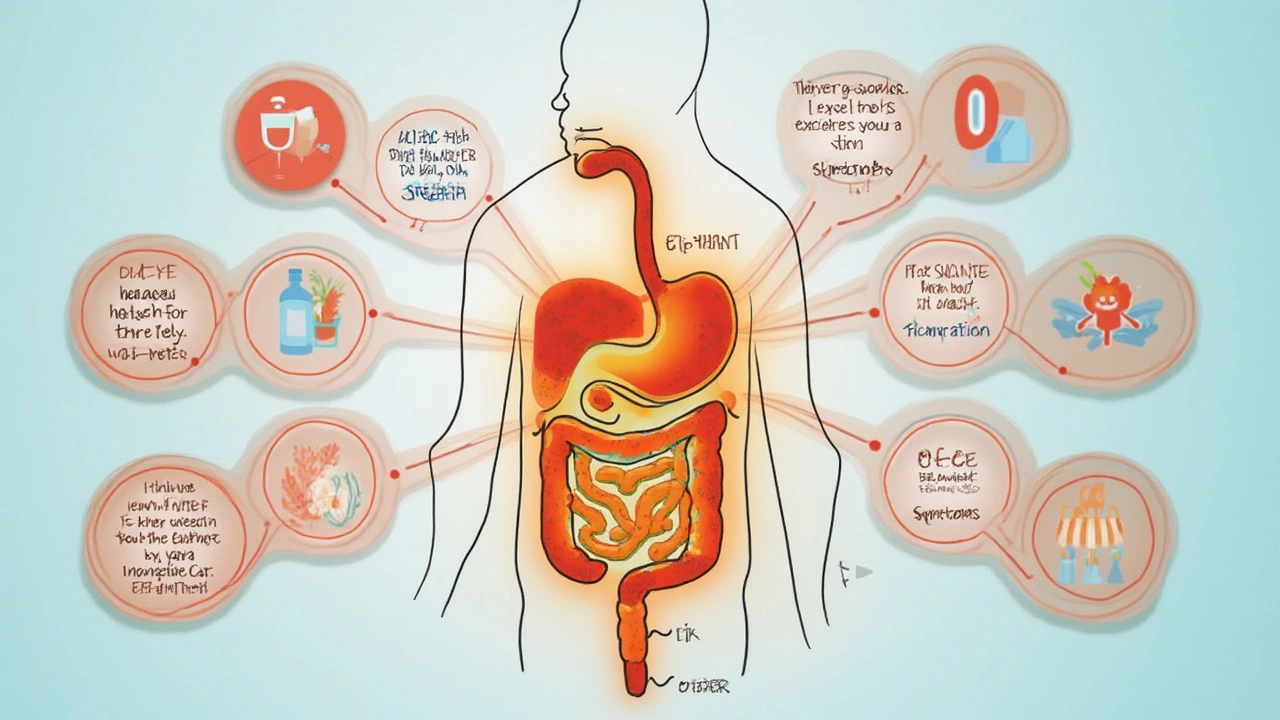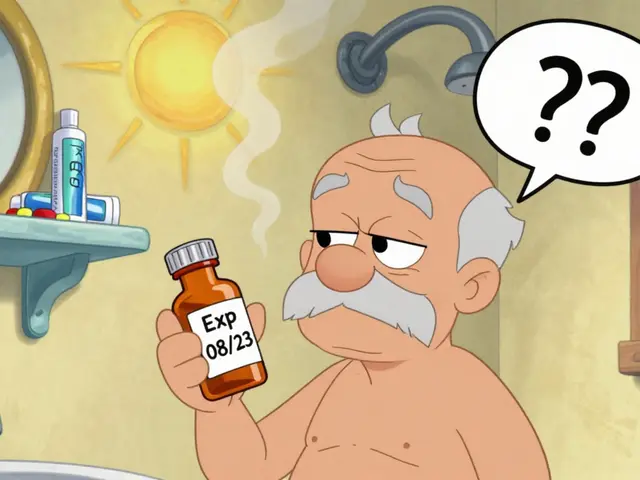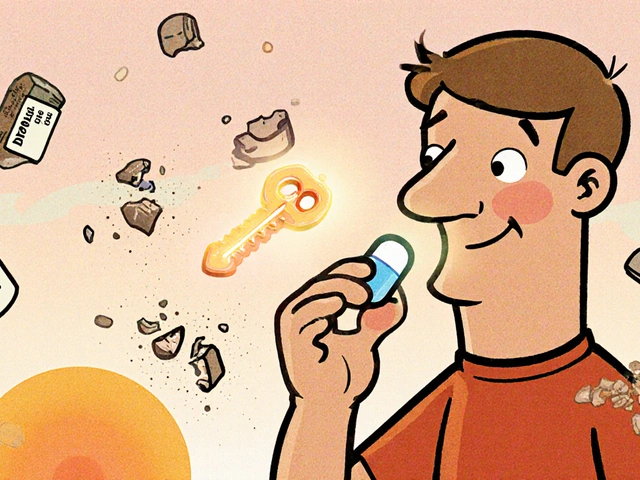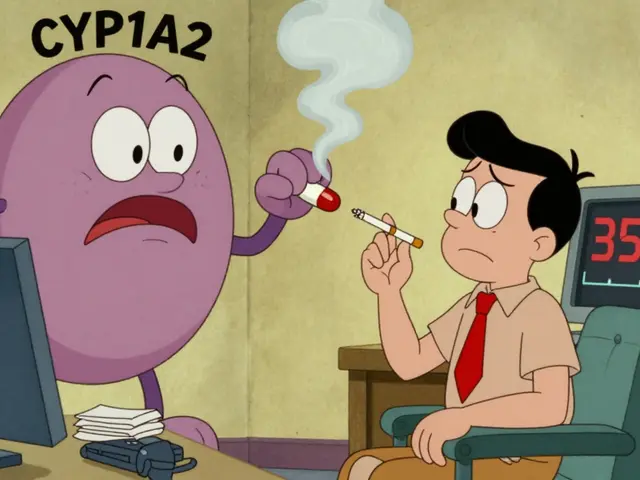You ever wake up in the middle of the night, throat burning and stomach doing somersaults, wondering if you accidentally swallowed a blowtorch? If yes, you’re definitely not alone. Around 60 million Americans get heartburn at least once a month. It’s so common, drugstore shelves have entire sections devoted to acid relief. One bottle that pops up everywhere: prilosec. But does it really work, and are there downsides? Before you let your morning cup of coffee face off with that little purple pill, let’s get real about what Prilosec actually does.
How Prilosec Tames Heartburn and Acid Reflux
Lots of people think Prilosec is just another antacid, but it’s not that simple. Prilosec’s real name is omeprazole, and it belongs to a group of pills called proton pump inhibitors (or PPIs for short). That’s a fancy way of saying it stops your stomach from pumping out too much acid, instead of just neutralizing acid already there like Tums or Rolaids would. If acid reflux feels like a volcano, PPIs work by keeping the magma from bubbling up in the first place.
But why is your stomach making so much acid? Usually, it’s to help digest food, especially protein, and keep nasty germs at bay. Sometimes though, your stomach kicks into overdrive. This can happen if you love spicy food, eat late at night, are dealing with stress, or have conditions like GERD (gastroesophageal reflux disease). With GERD, the valve that keeps acid in your stomach gets floppy, letting that acid sneak back up into your throat. That’s where Prilosec steps in. It turns down acid production at the cellular level, giving your throat and esophagus some much-needed healing time.
Doctors like to prescribe Prilosec not just for classic heartburn, but also for ulcers and some other acid-related problems. Sometimes people just grab it over-the-counter, since it’s approved for treating frequent heartburn (meaning, twice a week or more). In fact, a 2018 report showed that omeprazole is one of the twenty most prescribed drugs in the U.S.—it’s definitely tried and tested.
| Condition | How Prilosec Helps |
|---|---|
| Frequent Heartburn | Reduces acid, relieves burning sensation |
| Gastric Ulcers | Allows ulcers in the stomach lining to heal |
| Duodenal Ulcers | Stops acid from worsening damage |
| GERD | Heals esophagus, reduces pain and inflammation |
| Zollinger-Ellison Syndrome | Controls very high acid production |
Still, some people notice Prilosec doesn’t work instantly. Unlike chewables, you can’t just pop one after pizza and expect fireworks to stop. It usually takes a day or two—sometimes up to four—before you really feel relief. That’s why it’s best for folks dealing with regular, ongoing problems, not just the occasional taco-fueled burn. And the relief lasts a good 24 hours, which is a big win if you’re tired of dosing multiple times a day.

What Happens When You Take Prilosec? Risks, Side Effects, and Myths
I get it: medicines that mess with your stomach can sound intimidating. You might have read scary headlines about PPIs—are they really as dangerous as people say? Here’s the deal. Plenty of folks take Prilosec for weeks or months with no major issues. Still, nothing is risk-free, so knowing possible side effects is the responsible thing to do.
The most common complaints are pretty mild: headaches, nausea, a little belly pain, maybe some gas. Some people find themselves more prone to diarrhea or constipation. With my own stomach, if I try Prilosec more than a few days when heartburn acts up, I notice my appetite gets a little weird, but nothing major. Luna, my cat, seems more disturbed by my tossing and turning than any side effect, really.
But what about the bigger risks? Those only come up if you’re taking Prilosec for a long time—think months, not days. There’s some evidence that very long-term use can affect how your body absorbs vitamin B12, magnesium, and calcium. This can show up as fatigue, muscle cramps, or even weaker bones down the line. A few large studies link chronic PPI use with a higher risk of certain infections like C. diff or pneumonia, since your stomach acid usually kills a lot of nasty bugs. But if you’re using it as directed for a short stretch, these risks are pretty low.
Worried about kidney problems or dementia? Don’t panic. Some headlines have hinted at this, but the actual science is a lot less clear. The absolute risk is pretty small, especially if you’re relatively healthy and stick to short courses. Still, if you have kidney trouble, osteoporosis, or other chronic conditions, talk with your doctor before starting Prilosec. Don’t just buy a box at the drugstore and hope for the best. And if you ever notice dark stools, severe stomach pain, or vomiting while on Prilosec, get checked out right away. Those could be signs of something more serious.
A few more quick facts:
- Prilosec can interact with some medications—especially blood thinners (like clopidogrel), antifungals, and even certain HIV medicines. Always double-check with your doctor or pharmacist if you’re taking anything long-term.
- It’s safest to take the pill whole, before your first meal of the day. Crushing or splitting it can make it less effective.
- Kids can take Prilosec, but only under medical supervision. Doses for children are very different than for adults.
- If you’re pregnant or breastfeeding, omeprazole is sometimes used safely, but definitely run it by your doctor first to be sure.
If you’ve ever heard that stopping Prilosec suddenly can make your symptoms worse, you’re not imagining it. When you stop taking it after long use, your stomach acid can overshoot, causing rebound reflux. The trick here is to taper off slowly (if possible) rather than quitting cold turkey. Ask your doctor about the best way to cut back if you want to stop.

Practical Tips for Managing Heartburn: Beyond the Pill
Okay, maybe you’re thinking: Is Prilosec the only way to tame heartburn? Actually, some simple lifestyle tweaks can make a world of difference. Even with a prescription in hand, most doctors will nudge you to try these changes too—they’re gentler on your body and can help Prilosec work even better.
For starters, keep meals smaller and give yourself at least two hours before lying down. Gravity helps keep stomach acid where it belongs. If late-night Netflix snacks are your weakness (I know, the struggle), try cutting down or at least propping up your head with extra pillows while you watch. Fatty foods, tomato-based sauces, chocolate, peppermint, caffeine, and alcohol are some of the biggest triggers—it’s annoying, but figuring out your own personal heartburn enemies can save you a lot of pain. Write down what you eat and when the burn hits, and look for patterns.
- Wear looser clothes around your waist—tight pants and belts put extra pressure on your stomach.
- Eat slowly and chew well; wolfing down food can ramp up acid production.
- If you smoke, quitting is a double win: cigarettes relax that valve meant to keep acid in your stomach.
- Lose a few pounds if you’re carrying extra weight—studies show even five to ten percent weight loss can cut heartburn episodes by half.
- Don’t ignore stress—high stress wakes up your stomach acids. Try breathing exercises, walks, or even something simple like petting an animal (Luna definitely approves of this method).
There are also non-prescription remedies that work for mild or occasional heartburn—chewables, H2 blockers like famotidine (Pepcid), or old-school antacids during a flare-up. These are fine for spot-use, but if your symptoms are sticking around more than two weeks, don’t just self-medicate forever. Doctors say if you need Prilosec (or anything like it) for longer than that, get checked for deeper problems—like ulcers, infection, or damage to the esophagus.
One more tip? Don’t mix Prilosec with food or drinks meant to "settle your stomach," like milk or cola. They won’t help the medicine work better—and sometimes they’ll make the whole thing worse. Stick to a little plain water, eat your meal, and let the pill do its job inside your gut.
Finally, always let your doctor know about new symptoms. Heartburn that suddenly gets worse with weight loss, trouble swallowing, or chest pain should never be brushed off as just "bad reflux." Sometimes, these are clues to bigger health issues that need real investigating. Listen to your body. And yes, even if you hate the idea of another clinic visit, it’s better than playing roulette with your health.






KIRAN nadarla
July 18, 2025 AT 15:34Alright, let me just say straight up: Prilosec isn’t some magic fix-all for your heartburn troubles. It’s a proton pump inhibitor, meaning it works by blocking the acid production in your stomach. Simple enough, but the catch is in the details.
Many people overlook the long-term side effects, from nutrient absorption issues like magnesium deficiency to the increased risk of certain infections. Not to mention, popping it like candy without consulting a doc is a bad move. The article is good for beginners, but I'd stress learning about who really needs it and who might be better off with lifestyle tweaks first.
Also, when you’re dealing with persistent reflux, why not pair meds with some diet changes? It makes a big difference. Anyway, this piece is a decent kickoff to the topic, but it barely scratches the surface of what you should know before starting Prilosec.
Kara Guilbert
July 20, 2025 AT 07:34Honestly, I’m surprised there isn’t more emphasis on the side effects given how many people just self-prescribe this stuff. Like, nobody talks about how it can lead to nasty issues like kidney problems or even increased risk of fractures if used longterm. It’s kinda scary.
Also, there’s always that one thing: people using it as an excuse to eat garbage and expect the pill to fix everything. Nope. Not how it works. You gotta think about your health holistically, folks. Sure, Prilosec helps, but it’s not a free pass to ignore your diet or exercise.
We really need more public awareness, not just blurbs about how to use it safely.
Sonia Michelle
July 23, 2025 AT 13:54I really appreciate how this article tries to balance pharmaceutical info with lifestyle advice. It’s tempting these days to reach for a pill first, but holistic wellbeing is key.
Besides, understanding how Prilosec works helps patients feel empowered, rather than confused or scared. Knowing about the acid-reduction mechanism and its impact on digestion leads to smarter choices overall.
Of course, I’d like to see more on alternative strategies for managing heartburn—things like mindfulness eating or smaller meals. But as a primer, this is supportive and friendly without being overwhelming.
Has anyone here combined Prilosec with dietary changes and seen good results? I’d love to hear real-world experiences.
Neil Collette
July 27, 2025 AT 10:07Oh great, another article telling us to trust Big Pharma and medicating ourselves without a second thought! Get real. Prilosec might reduce acid, but it’s basically covering up symptoms rather than fixing underlying issues like diet or stress.
If you rely on this stuff longterm, you’re just digging your own grave with all those potential side effects they gloss over here. Magnesium depletion? Increased infections? But hey, pop a pill and ignore the warnings, that’s what everyone does.
Honestly, people need to stop being lazy and figure out what’s triggering their heartburn instead of begging for chemical crutches. It’s high time we demand better, more transparent health info instead of these feel-good pharma ads disguised as articles.
Anyone else sick of the medical circus?
James Lee
July 30, 2025 AT 13:41Frankly, this article strikes me as yet another watered-down, buzzword-ridden piece written for the masses who can’t handle the complexity of medicine. Prilosec, omeprazole—whatever, it’s just a proton pump inhibitor.
But the nuances? The pharmacodynamics, pharmacokinetics, patient-specific risk factors? Nada. They just give you a paragraph and say, 'here, take this, it reduces heartburn.' Where’s the intellectual depth?
For anyone keen, I recommend diving into peer-reviewed papers rather than these overly simplistic blog posts.
Still, I suppose for many, such articles serve as a gentle nudge towards consulting a real professional, so it’s not all bad.
Dennis Scholing
August 4, 2025 AT 09:14Thank you for sharing this informative article. Prilosec is indeed a valuable medication when used correctly and under medical supervision. The detailed explanation of its mechanism helps users understand why they should comply strictly with dosing instructions.
The article could be improved with clearer guidelines on identifying contraindications and potential drug interactions. Nevertheless, emphasizing lifestyle modifications alongside medication is pivotal and well noted here.
Remember, patient education is key—taking responsibility for one’s health includes informed decisions and communication with healthcare providers.
Kasey Lauren
August 8, 2025 AT 19:04I just want to add that it’s really encouraging to see the article mention ways besides medication to deal with heartburn. Sometimes people feel stuck thinking a pill is the only answer, but honestly, simple changes can make such a difference.
For me, avoiding late-night snacking and managing stress have been total game changers. Prilosec helps when things get really bad, but I try not to rely on it too much.
It’s all about balance and listening to your body. Stay hopeful, everyone!
Abhimanyu Singh Rathore
August 11, 2025 AT 04:34Oh my goodness!!! The number of exclamations needed to stress that this article is a crucial read for anyone experiencing heartburn cannot be overstated!!! I’ve personally seen how omeprazole-like medications can change a person’s quality of life dramatically!!! But, caution is the key!!!
Overusing or combining without doctor’s input??? Disaster waiting to happen!!!! The biochemical mechanisms to understand how Prilosec affects gastric acid is fascinating and should be understood more widely!!!
Also, folks, please do not disregard the potential side effects mentioned!!! They are not just side notes but real concerns!!! Stay safe and informed!!!
Stephen Lewis
August 14, 2025 AT 03:24In my experience as a healthcare professional, I have observed that patients often misunderstand the purpose of proton pump inhibitors like Prilosec. The emphasis should always be on the appropriate indications and the shortest effective duration to mitigate risks.
Furthermore, sustained lifestyle modification is paramount. The article touches on this but could benefit from additional detail regarding dietary triggers and behavioral adjustments to better assist patients.
Successful management of GERD or acid reflux requires both medical and lifestyle strategies working in concert, something every patient should be thoroughly counselled on.
janvi patel
August 16, 2025 AT 11:14Eh, I feel like people often blow Prilosec side effects out of proportion. Yeah, you shouldn’t take it like candy, but when used responsibly, it’s a safe and dependable drug. Some folks just like to make mountains outta molehills whenever it comes to medication.
Also, not everyone can just fix heartburn with lifestyle changes. Sometimes you need actual medicine. So maybe chill a bit with all the moralizing. This was a simple & helpful overview, which is all some people want.
Lynn Kline
August 17, 2025 AT 15:01Omg yes!!! This is just the kind of vibrant, informative content we all need!!! Heartburn can be so frustrating and debilitating, and having a clear, concise guide on Prilosec usage feels like a total win!!!
Adding colorful lifestyle tips makes the whole thing feel much more alive and human. We gotta talk about food, stress, habits—not just the meds!!!
Also, don’t forget to share this with your friends and fam who might be silently suffering!!! Let’s spread the knowledge and empower each other!!! 🌟✨